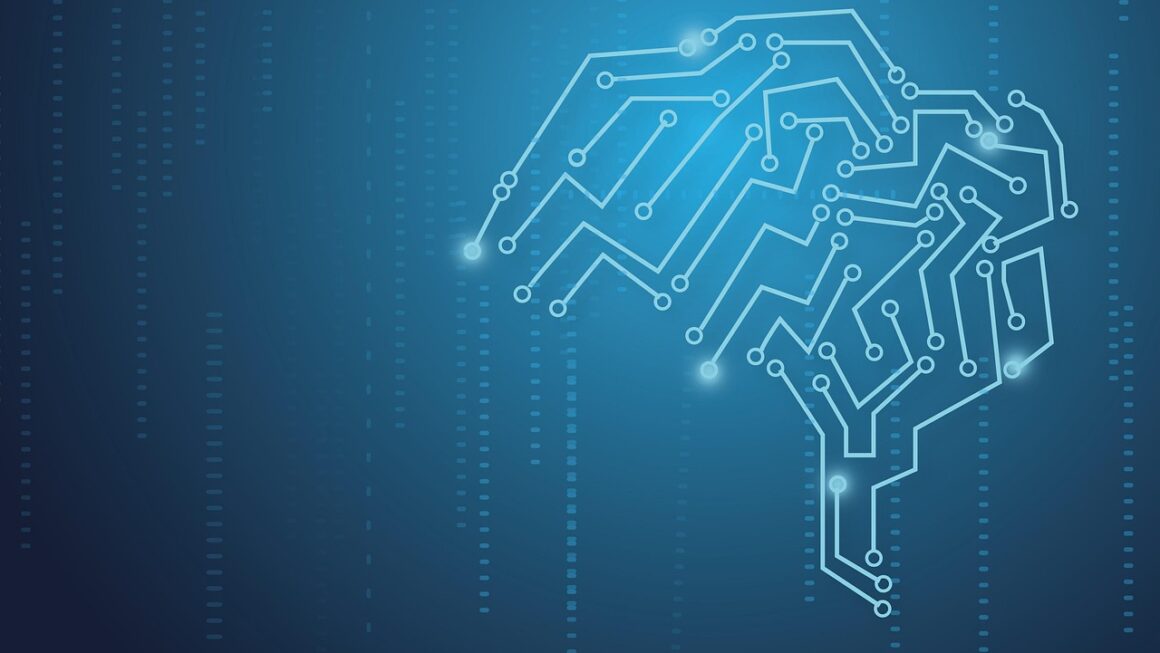Artificial intelligence (AI) is no longer a futuristic fantasy; it’s a present-day reality revolutionizing industries and transforming the way we live and work. From streamlining business processes to enhancing customer experiences, AI’s potential is vast and ever-expanding. This blog post delves into some of the most impactful AI use cases across various sectors, providing practical examples and actionable insights. Whether you’re a business leader, tech enthusiast, or simply curious about AI, this guide will offer a comprehensive overview of its transformative power.
AI in Healthcare
The healthcare industry is experiencing a significant transformation thanks to artificial intelligence. AI applications are improving diagnostics, personalizing treatments, and streamlining administrative tasks, ultimately leading to better patient outcomes and reduced costs.
Diagnostics and Early Detection
AI algorithms can analyze medical images like X-rays, CT scans, and MRIs with remarkable accuracy, often surpassing human capabilities in detecting subtle anomalies indicative of diseases.
- Example: AI-powered tools are being used to detect early signs of lung cancer from CT scans, enabling timely intervention and significantly improving survival rates.
- Benefits:
Faster and more accurate diagnoses.
Early detection of diseases, leading to better treatment outcomes.
Reduced workload for radiologists and other medical professionals.
Personalized Medicine
AI can analyze a patient’s genetic information, medical history, and lifestyle factors to create personalized treatment plans tailored to their specific needs.
- Example: AI is helping oncologists determine the most effective chemotherapy regimen for cancer patients based on their individual genetic profiles.
- Benefits:
More effective treatments with fewer side effects.
Improved patient outcomes.
Reduced healthcare costs due to targeted therapies.
Drug Discovery and Development
AI is accelerating the drug discovery process by identifying potential drug candidates, predicting their efficacy, and optimizing their molecular structures.
- Example: AI algorithms are used to screen vast libraries of chemical compounds to identify molecules that may have therapeutic potential for treating diseases like Alzheimer’s and Parkinson’s.
- Benefits:
Faster drug development cycles.
Reduced costs associated with drug discovery.
Increased likelihood of finding effective treatments for diseases.
AI in Finance
The financial industry is leveraging AI to automate processes, detect fraud, and provide personalized financial advice. AI’s ability to analyze vast amounts of data and identify patterns makes it invaluable for financial institutions.
Fraud Detection and Prevention
AI algorithms can analyze transaction data in real-time to identify suspicious activities and prevent fraudulent transactions.
- Example: Banks use AI-powered systems to monitor credit card transactions and flag potentially fraudulent purchases based on factors like location, amount, and frequency.
- Benefits:
Reduced financial losses due to fraud.
Improved security for customers.
Enhanced efficiency in fraud detection processes.
Algorithmic Trading
AI-powered trading algorithms can analyze market data and execute trades automatically, often outperforming human traders in terms of speed and accuracy.
- Example: Hedge funds and investment firms use AI algorithms to identify arbitrage opportunities and execute high-frequency trades.
- Benefits:
Increased trading efficiency.
Improved investment returns.
Reduced emotional biases in trading decisions.
Personalized Financial Advice
AI-powered chatbots and virtual assistants can provide personalized financial advice to customers based on their financial goals, risk tolerance, and investment preferences.
- Example: Robo-advisors use AI to create and manage investment portfolios for individuals based on their individual circumstances.
- Benefits:
Accessibility to financial advice for a wider range of individuals.
Personalized investment strategies tailored to individual needs.
Lower fees compared to traditional financial advisors.
AI in Manufacturing
AI is transforming the manufacturing industry by optimizing processes, improving quality control, and enhancing worker safety.
Predictive Maintenance
AI algorithms can analyze sensor data from machines to predict when maintenance is required, preventing costly downtime and extending the lifespan of equipment.
- Example: Manufacturers use AI to monitor the vibration and temperature of machinery to predict when a component is likely to fail.
- Benefits:
Reduced downtime due to unexpected equipment failures.
Lower maintenance costs.
Increased equipment lifespan.
Quality Control
AI-powered vision systems can inspect products for defects with greater accuracy and speed than human inspectors, ensuring higher product quality.
- Example: Manufacturers use AI to inspect electronic components for defects and automatically reject those that do not meet quality standards.
- Benefits:
Improved product quality.
Reduced waste due to defective products.
Increased efficiency in quality control processes.
Robotics and Automation
AI-powered robots can perform repetitive and dangerous tasks, freeing up human workers to focus on more complex and creative activities.
- Example: Manufacturers use AI-powered robots to assemble products, weld components, and paint surfaces.
- Benefits:
Increased productivity.
Improved worker safety.
Reduced labor costs.
AI in Customer Service
AI is revolutionizing customer service by providing faster, more efficient, and personalized support.
Chatbots and Virtual Assistants
AI-powered chatbots can answer customer questions, resolve issues, and provide support 24/7.
- Example: E-commerce websites use chatbots to answer common customer inquiries about order status, shipping information, and return policies.
- Benefits:
Improved customer satisfaction.
Reduced wait times for customers.
Lower customer service costs.
Sentiment Analysis
AI algorithms can analyze customer feedback from surveys, reviews, and social media to understand customer sentiment and identify areas for improvement.
- Example: Businesses use sentiment analysis to track customer satisfaction with their products and services and identify potential issues that need to be addressed.
- Benefits:
Improved customer understanding.
Enhanced product and service quality.
Increased customer loyalty.
Personalized Recommendations
AI can analyze customer data to provide personalized product recommendations and offers, increasing sales and improving customer engagement.
- Example: E-commerce websites use AI to recommend products to customers based on their past purchases, browsing history, and demographics.
- Benefits:
Increased sales.
Improved customer engagement.
Enhanced customer loyalty.
AI in Marketing
AI offers marketing teams powerful tools to analyze data, automate campaigns, and personalize customer experiences.
Targeted Advertising
AI analyzes user data to deliver highly targeted advertisements, increasing conversion rates and maximizing advertising ROI.
- Example: Social media platforms use AI to show users advertisements that are relevant to their interests and demographics.
- Benefits:
Increased advertising effectiveness.
Reduced advertising waste.
Improved customer engagement with advertising content.
Content Creation
AI tools can assist in content creation, generating blog posts, social media updates, and even marketing copy.
- Example: AI is used to generate product descriptions for e-commerce websites or to create different variations of ad copy for A/B testing.
- Benefits:
Reduced time and effort spent on content creation.
Increased content output.
Potential for creative inspiration.
Customer Segmentation
AI automatically segments customers into distinct groups based on their behavior and preferences, enabling marketers to tailor their messaging and offers accordingly.
- Example: Email marketing platforms use AI to segment subscribers based on their engagement with previous emails and website activity.
- Benefits:
Improved email marketing campaign effectiveness.
Higher open and click-through rates.
Increased customer loyalty and lifetime value.
AI in Transportation
AI is poised to revolutionize transportation through autonomous vehicles, optimized traffic management, and enhanced logistics.
Autonomous Vehicles
AI powers the perception, decision-making, and control systems of self-driving cars, trucks, and buses.
- Example: Companies are testing autonomous vehicles in controlled environments and on public roads, aiming for widespread deployment in the coming years.
- Benefits:
Increased safety due to reduced human error.
Improved traffic flow.
Reduced fuel consumption.
Route Optimization
AI algorithms can optimize delivery routes for logistics companies, minimizing travel time and fuel costs.
- Example: Delivery companies use AI to plan delivery routes that take into account traffic conditions, weather forecasts, and delivery time windows.
- Benefits:
Reduced delivery costs.
Faster delivery times.
Improved customer satisfaction.
Traffic Management
AI can analyze traffic data to optimize traffic flow and reduce congestion.
- Example: Smart traffic light systems use AI to adjust traffic signal timing based on real-time traffic conditions.
- Benefits:
Reduced traffic congestion.
Improved air quality.
Reduced travel times.
Conclusion
Artificial intelligence is rapidly transforming industries across the board, offering innovative solutions to complex problems and creating new opportunities for growth and efficiency. From healthcare to finance, manufacturing to customer service, and beyond, AI’s impact is undeniable. By understanding the various AI use cases and leveraging its potential, businesses and individuals alike can unlock new levels of productivity, innovation, and success. As AI technology continues to evolve, its influence will only continue to grow, shaping the future of work and the way we interact with the world around us. Staying informed about the latest advancements in AI and exploring its practical applications is crucial for navigating the rapidly changing landscape and harnessing its transformative power.




